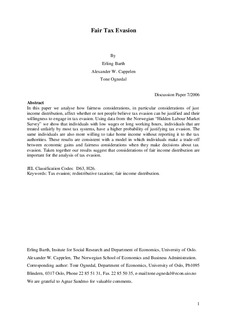| dc.contributor.author | Cappelen, Alexander W. | |
| dc.contributor.author | Barth, Erling | |
| dc.contributor.author | Ognedal, Tone | |
| dc.date.accessioned | 2006-07-12T08:22:33Z | |
| dc.date.available | 2006-07-12T08:22:33Z | |
| dc.date.issued | 2006-04 | |
| dc.identifier.issn | 0804-6824 | |
| dc.identifier.uri | http://hdl.handle.net/11250/162738 | |
| dc.description.abstract | In this paper we analyse how fairness considerations, in particular considerations of just
income distribution, affect whether or not people believe tax evasion can be justified and their
willingness to engage in tax evasion. Using data from the Norwegian “Hidden Labour Market
Survey” we show that individuals with low wages or long working hours, individuals that are
treated unfairly by most tax systems, have a higher probability of justifying tax evasion. The
same individuals are also more willing to take home income without reporting it to the tax
authorities. These results are consistent with a model in which individuals make a trade-off
between economic gains and fairness considerations when they make decisions about tax
evasion. Taken together our results suggest that considerations of fair income distribution are important for the analysis of tax evasion. | en |
| dc.format.extent | 85873 bytes | |
| dc.format.mimetype | application/pdf | |
| dc.language.iso | eng | en |
| dc.publisher | Norwegian School of Economics and Business Administration. Department of Economics | en |
| dc.relation.ispartofseries | Discussion paper | en |
| dc.relation.ispartofseries | 2006:7 | en |
| dc.subject | tax evasion | en |
| dc.subject | redistributive taxation | en |
| dc.subject | fair income distribution | en |
| dc.title | Fair tax evasion | en |
| dc.type | Working paper | en |
